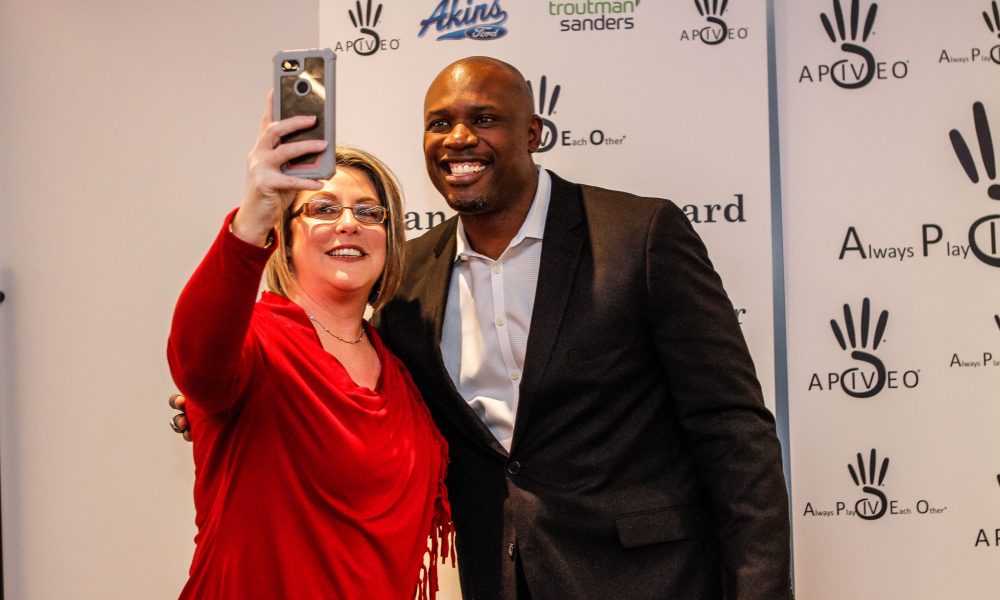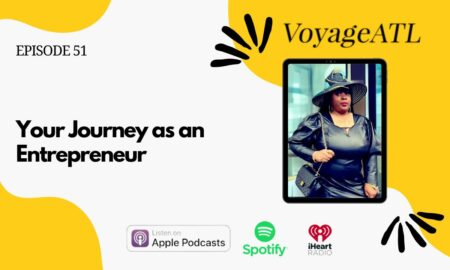

Today we’d like to introduce you to C.J. Stewart.
So, before we jump into specific questions, why don’t you give us some details about you and your story.
I fell in love with baseball around the age of 6. My grandfather would watch Chicago Cubs day games on WGN. Summers were hot in Atlanta so we would sit in the room and watch the game with the air conditioning roaring. I remember the A/C hanging out of the window. We didn’t talk about the game or our favorite player. Harry Carey was the famous Cubs’ announcer and I knew his voice well. My mother said that at age six, I was already saying I wanted to be a pro baseball player.
When I was 8, my parents signed me up to play baseball at the Cascade Youth Organization, which was less than five miles from my grandparent’s house. When the Cubs games would end, I would go outside and practice my swing by throwing rocks in the air and perfectly timing them to hit as far as I could like Gary Matthews. I improved my pitching by throwing rocks at trees.
At 14, I met T.J. Wilson. He was a veteran Atlanta Police Department Officer known for discovering hidden gems in Atlanta’s baseball community. I was going into my freshman year at Westlake High School in Atlanta. His daughter was a senior at Westlake, and his son was in middle school. He was preparing to join the Westlake baseball team the following year.
I guess you can say Coach T.J. was scouting who would be playing alongside his son in the future. I’m glad he found me. Within weeks of getting to know Coach T.J., I was receiving professional baseball training at an indoor baseball facility in Forsyth County with Denny Pritchett. I had my first professional workout with the Cubs when I was 14. I was inching toward fulfilling my dream of being a “Cubbie.”
I ended up signing a baseball scholarship with Georgia State University during my senior year of high school. I also was drafted by the Cubs. My life is an example of how great things happen when your talent is an asset combined with advocacy and access. Coach T.J. is one of the major reasons why and how I lead in Atlanta as the Chief Empowerment Officer for L.E.A.D., Inc. (Launch, Expose, Advise, Direct).
I have achieved a lot of success in life and now, I am committed to using my success to serve others. That’s what significance is all about. You cannot give what you do not have, and Black boys deserve and need access to the best of people and resources. I am among the best baseball hitting coaches in the country. I am a case study on how to make it out of poverty in the inner-City of Atlanta and live a life of prosperity.
In 1998, along with my wife, Kelli, I co-founded our for profit business, Diamond Directors, which provides the blueprint of success for diamond sports athletes. By 2007, I earned the recognition of being one of the top baseball player development professionals in the country due to my unmatched success in the player development industry.
With over 20 years of experience, I have developed some of the game’s top amateur, collegiate and professional players. My client list includes Jason Heyward (Chicago Cubs), Dexter Fowler (St. Louis Cardinals), Andrew Jones (Rakuten Eagles, former Atlanta Brave), Andrew McCutchen (San Francisco Giants), and Peter Alonso (New York Mets).
We established L.E.A.D. in 2007 as a 501c3 organization. Our mission is to empower an at-risk generation to lead and transform their city of Atlanta. Through year-round, sports-leadership programming like baseball, we empower 350 Black boys from 6th-12th grades in Atlanta Public Schools to overcome crime, poverty and racism so they can win at the game of life.
Baseball is called America’s Pastime. I have always wanted to believe that. I spent my life chasing the dream and helping others do the same. When I look at the game today, I see it as a microcosm of the American Dream. Some people get what is needed to follow their path and enjoy the experience, while others do not.
If you look closely at the decline of African-American participation in the sport, you will see what I see. The decline is a social justice issue that cannot be solved until we view it through that lens.
The issue is something that is near and dear to my heart. When I challenge white college coaches about not having as many African-American players as others on their rosters, many say their edict is to recruit the best players in order to win.
I do not believe that assessment measures up. For the past 20 years, I have lived and breathed the game of baseball, logging more than 20 years of developing and scouting elite level players. I can tell you explicitly that African-American communities across the country are rich in baseball talent, proven by the fact they’re already are hundreds competing at the NCAA D-I level.
This opportunity was made possible after Jackie Robinson carved a path for Dr. Martin Luther King, Jr.’s “I Have A Dream” speech. The trials and tribulations he endured proves, even today, that you must be adhered to with seriousness.
So yes, we need more Black boys to participate in baseball. But to do so, we must own up to the fact that there are tens of thousands eagerly awaiting for their opportunity.
During the 2017-18 school year, nearly 490,000 boys played high school baseball in the United States. Of that number, say 10% were African-American. That is 4,900 African-American boys playing high school baseball. Is that number too hard to believe?
Rhetoric suggests that African-American males are “born good athletes,” yet some believe they are not capable of throwing, catching or hitting a baseball like the Negro Legends who helped save Major League Baseball.
Do you believe that?
Let us say that only 10 percent of those 4,900 African-American high schoolers playing baseball were “good enough” to compete in the classroom and on the baseball field at the NCAA D-I level.
That number is 490.
That means that at any given time, there should be close to 490 African-American males playing baseball at the NCAA D-I level. Why is that not a reality? I believe there are three threats impeding their progress:
1. Implicit bias
2. Colorblindness
3. Blackballing
To help turn this way of thinking around, I am proposing a five-point plan that every baseball organization and community can implement. Let us call it the 5 P’s:
1. Participate
There is no shortage of opportunities for African-American youth to participate in baseball because it is the easiest thing to organize. Participation is the first step to increasing the amount of players performing at the collegiate and Major League levels.
2. Practice
Once a player demonstrates a love for the game at the participatory level, it is time to learn how to practice. This requires commitment and discipline. Commitment is a promise made and kept. Discipline is doing the things that need to be done, even when you do not want to do them.
Having a love for the game is important because you cannot master something without loving it. Players who love baseball possess commitment and discipline. If stressed properly, both of these characteristics should last a lifetime, helping a player win on and off the field. Commitment and discipline are skills that last a lifetime.
3. Play
Learning how to play baseball does not make sense if you do not know how to practice. Playing the game is nothing short of testing what you are working on at practice. Translation: Practice prepares you to play in the game, and the game dictates what you work on in practice.
Growing up, I did not have access to coaches who were former MLB players. Most of my coaches loved the game and a few played at the D-II level. I learned how to play under their leadership because they allowed me to play the game. We focused on the mistakes made at practice and learned how to make adjustments.
I remember playing in my neighborhood with a tennis ball, a stick and some friends. We received lots of reps uninterrupted by a “coach.” We were our own coaches. As we see too often, coaches can unintentionally coach the critical thinking skills out of a player.
4. Perform
When a player reaches the level that allows him to perform, he has earned the right to compete at the collegiate and/or professional level. Performance requires skills developed as a result of practicing under pressure. The skill yields game impact. Strike the right balance and you can avoid excuses like: “I’m tired.” “I’ve never faced this type of pitcher.” “I’m hurt.”
Performance is the ability to get things done in spite of the circumstances. Players who perform know their ability so well that they can make guarantees and execute. They do not focus on getting hits; they focus on executing what it takes to get a hit (timing and tracking pitches, repeating their approach, etc.). Getting hits is the effect, not the cause.
Players cannot learn how to perform until they learn how to participate, practice and play.
5. Protection
The other P’s do not mean anything if we are not protected. When African-American males do not feel their dreams are being protected, they oftentimes are unable to reach an optimum level of performance. Nobody wants to feel like they are doing something in vain.
African-American males often go unprotected because they are silent and deemed naturally resilient. Their silence could be the result of a lack of self-confidence. Their resilience could be the result of having to make things happen on their own.
Boys should not have to figure things out of their own. African-American males need heroes more than they need coaches.
As we see too often, structural racism is a real thing. It shows up in baseball as implicit bias, colorblindness and blackballing. It is time to break the chain.
Has it been a smooth road?
Coaching by way of Diamond Directors and L.E.A.D. has not been a smooth road. What I have discovered over the years is that youth believe talent is the ceiling when it is actually the floor. Talent is what you do well and habits is what you do well repeatedly without thought.
But skills pay the bills. Skills is what you do well repeatedly without thought while under stress. Getting youth to be committed and disciplined so that they can develop habits and skills is not impossible. When it happens, it typically happens by way of conviction. I am really good at convicting people. Conviction is what connected me to my life purpose of coaching.
Please tell us about L.E.A.D., Inc. | Diamond Directors.
Diamond Directors provides the blueprint of success for diamond sports athletes. I specialize in accessing hitters talent and converting that talent to habits and skills. I am most proud that my amateur and professional clients have earned several awards for their contributions on the field, while several others have been recognized for their commitment to service in the community that they live and play.
What sets me apart from others is my ability to quickly assess my clients learning styles, aptitude and awareness. My ability to train my clients anytime, anywhere using my proven training methodology, ATBATS, is a game-changer as well.
Through year-round, sports-leadership programming (baseball), L.E.A.D. empowers 350 Black boys from 6th-12th grades in Atlanta Public Schools to overcome crime, poverty and racism so they can win at the game of life. Empowerment means to give responsibility and authority. L.E.A.D. specializes in scouting out counted out Black boys in Atlanta Public Schools that struggle with grades, attendance, behavior, as well as living at or below the poverty level. I am most proud of our impact stats that include:
• 100% high school graduation rate
• 93% college enrollment
• 90% scholarship rate
• 3,500 annual service hours
What sets L.E.A.D. apart from others is our ability to help counted out Black boys escape poverty.
How do you think the industry will change over the next decade?
I see baseball at the collegiate and professional levels having more African-American players competing. The declining numbers at both levels are appalling. On Feb. 13, 1920, under the leadership of Rube Foster, teams from eight cities formally created the Negro National League.
According to Bob Kendrick, Negro League Baseball Museum (NLBM) President, “The Negro Leagues would operate for 40 years becoming a catalyst for economic growth in African-American communities across the country and helped spark social change in America.”
During its heyday, the Negro Leagues was one of the largest black-owned businesses in America. When the Negro Leagues stopped, the black economy declined with it.
US soccer star Julie Foudy once said, “Sports build good habits, confidence, and discipline. They make players into community leaders and teach them how to strive for a goal, handle mistakes, and cherish growth opportunities.”
I believe that wholeheartedly.
Contact Info:
- Address: L.E.A.D., Inc.
1266 W. Paces Ferry Road #429
Atlanta GA 30327-2306
Diamond Directors
1266 W. Paces Ferry Road #287
Atlanta GA 30327-2306 - Website: https://www.lead2legacy.org/ | https://diamonddirectors.com/
- Phone: (404) 662-2538
- Email: info@lead2legacy.org
- Instagram: https://instagram.com/leadatlanta2?igshid=vv8qqlcewd0c | https://instagram.com/diamond_directors?igshid=nef7dythk2b
- Facebook: https://www.facebook.com/LEAD2Legacy/ | https://www.facebook.com/diamonddirectorsplayerdevelopment/
- Other: http://linkedin.com/in/cjstewartatl
 Image Credits:
Image Credits:
Madison Jubin (main photo)
Eriel Dunnam
Suggest a story: VoyageATL is built on recommendations from the community; it’s how we uncover hidden gems, so if you or someone you know deserves recognition please let us know here.



















